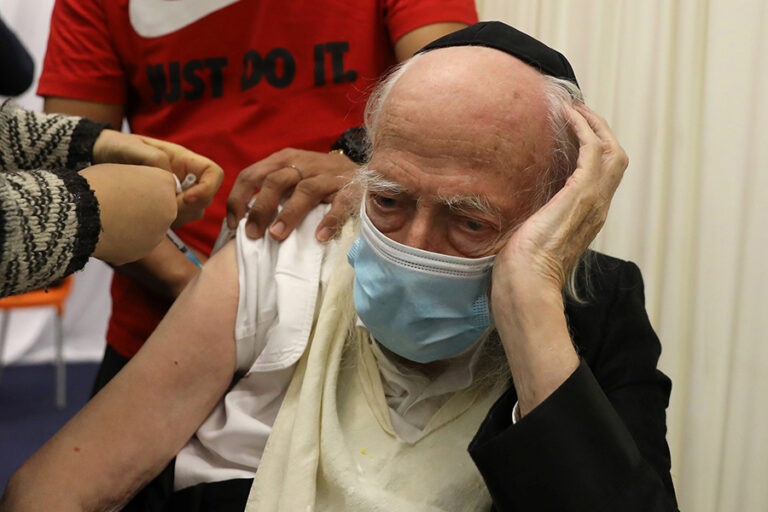VATICAN CITY — The Vatican’s doctrinal office said that when alternative vaccines are not available, it is morally acceptable to receive COVID-19 vaccines developed or tested using cell lines originating from aborted fetuses.
However, “the licit use of such vaccines does not and should not in any way imply that there is a moral endorsement of the use of cell lines proceeding from aborted fetuses,” said the Congregation for the Doctrine of the Faith.
“Both pharmaceutical companies and governmental health agencies are therefore encouraged to produce, approve, distribute and offer ethically acceptable vaccines that do not create problems of conscience for either health care providers or the people to be vaccinated,” it added in a note published Dec. 21.
The note “on the morality of using some anti-COVID-19 vaccines” had been reviewed by Pope Francis Dec. 17 and he ordered its publication, the doctrinal office said.
As vaccines against the novel coronavirus that causes COVID-19 are being distributed in some parts of the world, the doctrinal office said it has been receiving requests for guidance regarding the use of vaccines which, “in the course of research and production, employed cell lines drawn from tissue obtained from two abortions that occurred in the last century.”
The “diverse and sometimes conflicting pronouncements in the mass media by bishops, Catholic associations, and experts have raised questions about the morality of the use of these vaccines,” the congregation said.
Even though there are already some notes and instructions by the doctrinal office and the Pontifical Academy for Life regarding vaccines prepared from such cell lines, it said, “this congregation desires to offer some indications for clarification of this matter.”
The Catholic Church teaches that there are differing degrees of responsibility of cooperation with evil. That means that the responsibility of those who make the decision to use cell lines of illicit origin is not the same as those “who have no voice in such a decision,” the doctrinal office said, quoting from its 2008 instruction, “Dignitas Personae.”
“When ethically irreproachable COVID-19 vaccines are not available — e.g. in countries where vaccines without ethical problems are not made available to physicians and patients or where their distribution is more difficult due to special storage and transport conditions or when various types of vaccines are distributed in the same country but health authorities do not allow citizens to choose the vaccine with which to be inoculated — it is morally acceptable to receive COVID-19 vaccines that have used cell lines from aborted fetuses in their research and production process,” the doctrinal congregation wrote in the new note.
Using these vaccines is morally licit when the “passive material cooperation” with the evil of an abortion “from which these cell lines originate is, on the part of those making use of the resulting vaccines, remote.”
“The moral duty to avoid such passive material cooperation is not obligatory if there is a grave danger, such as the otherwise uncontainable spread of a serious pathological agent — in this case, the pandemic spread of the SARS-CoV-2 virus that causes COVID-19,” it said.
Therefore, in such a case, “all vaccinations recognized as clinically safe and effective can be used in good conscience with the certain knowledge that the use of such vaccines does not constitute formal cooperation with the abortion,” it said.
However, the doctrinal congregation emphasized that “the morally licit use of these types of vaccines, in the particular conditions that make it so, does not in itself constitute a legitimation, even indirect, of the practice of abortion, and necessarily assumes the opposition to this practice by those who make use of these vaccines.”
The congregation repeated the Vatican’s call on pharmaceutical companies and governmental agencies to produce, approve and distribute ethically acceptable vaccines, that is, without using morally compromised cell lines at all.
The doctrinal office also said that “vaccination is not, as a rule, a moral obligation and that, therefore, it must be voluntary.”
From an ethical point of view, “the morality of vaccination depends not only on the duty to protect one’s own health, but also on the duty to pursue the common good,” it added.
If there are no other means to stop or prevent an epidemic, the congregation said, “the common good may recommend vaccination, especially to protect the weakest and most exposed.”
Those who wish, for “reasons of conscience,” to refuse vaccines produced with cell lines from aborted fetuses, “must do their utmost to avoid, by other prophylactic means and appropriate behavior, becoming vehicles for the transmission” of the virus.
They must avoid putting at risk the health of those who cannot be vaccinated for medical or other reasons and who are the most vulnerable, it said.
Lastly, the congregation said it is “a moral imperative for the pharmaceutical industry, governments and international organizations to ensure that vaccines, which are effective and safe from a medical point of view, as well as ethically acceptable, are also accessible to the poorest countries in a manner that is not costly for them.”
Otherwise, this lack of access would become yet another sign of discrimination and injustice “that condemns poor countries to continue living in health, economic and social poverty.”
Copyright © 2020 Catholic News Service/U.S. Conference of Catholic Bishops


